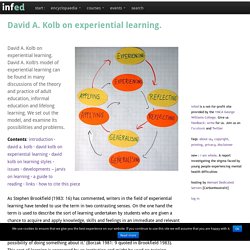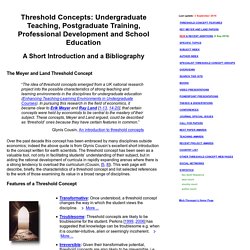

Learning with 'e's. Experiential learning articles + critiques of David Kolb's theory. David a. kolb on experiential learning. Contents: introduction · david a. kolb · david kolb on experiential learning · david kolb on learning styles · issues · developments – jarvis on learning · a guide to reading · links · how to cite this piece As Stephen Brookfield (1983: 16) has commented, writers in the field of experiential learning have tended to use the term in two contrasting senses.

On the one hand the term is used to describe the sort of learning undertaken by students who are given a chance to acquire and apply knowledge, skills and feelings in an immediate and relevant setting. Experiential learning thus involves a, ‘direct encounter with the phenomena being studied rather than merely thinking about the encounter, or only considering the possibility of doing something about it.’ (Borzak 1981: 9 quoted in Brookfield 1983). The second type of experiential learning is ‘education that occurs as a direct participation in the events of life’ (Houle 1980: 221).
Vygotsky. The Threshold Concept. Threshold Concepts in Practice (2016) Edited by Ray Land, Jan H.

F. Meyer and Michael T Flanagan Educational Futures: Rethinking Theory and Practice, Michael A Peters (Series Editor), volume 68Sense Publishers, Rotterdam/Boston/Taipei, 2016 ISBN: 978-94-6300-510-4 (paperback), ISBN: 978-94-6300-511-1 (hardback), ISBN: 978-94-6300-512-8 (e-book) Threshold Concepts in Practice brings together fifty researchers from sixteen countries and a wide variety of disciplines to analyse their teaching practice, and the learning experiences of their students, through the lens of the Threshold Concepts Framework.